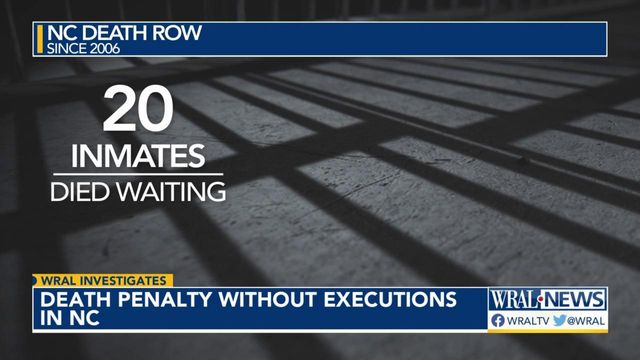North Carolina's middle ground: Death penalty is legal, but no one has been executed since 2006
In close to half of the states in the United States, the death penalty is written into law. So it came as a surprise to some when the man accused of shooting a child in the head accepted a plea that sentenced him to life in prison without parole.
In fact, North Carolina hasn't executed anyone since 2006, when lawsuits put executions here on hold.
Questions were raised over the lethal injection drugs used and whether a doctor must be present at an execution. Then, high-profile death row exonerations and racial bias research compounded the challenge.
A total 137 people are on North Carolina's death row, 19 of them added since 2006. Two of those condemned to death are women.
In that time, 20 of those waiting for their execution have died of natural causes, including Eric Lane, convicted of the 2022 rape and murder of a 5-year-old girl, who died on Thursday.
Another 38 people have been exonerated or had their death sentences commuted to life.
The family of 5-year-old Cannon Hinnant pressed for Darius Sessoms to get the death penalty, but prosecutors know, given the legal de facto death penalty moratorium, even a capital conviction would not guarantee his death.
"It’s not nearly enough, what he deserves," said Cannon's mother, Bonny Parker, after Sessoms was sentenced to life in prison. "He didn’t get justice today. We didn’t get closure today."
Dr. Matthew Robinson, a criminal justice professor at Appalachian State University, has published various studies on the state's death penalty.
"I don't oppose the death penalty on ethical grounds or moral grounds," he said. "I oppose it as a scientist that studies policy. It's simply just bad policy.
"If it was a deterrent to murder, you'd expect murder to go up when the state stopped executing (people), when in fact it went down," Robinson said.
The state spends over $42,000 per year to house each inmate in maximum security. At the same time, death penalty cases also cost 3 to 5 times what other murder trials cost, and taxpayers help cover hundreds of millions spent on settlements for wrongful convictions.
Bad policy or not, Robinson doesn't expect a change either to the law or the reality in North Carolina.
"My suspicion is that we'll continue on like this for who knows how many years if not decades," he said.
He believes that's because North Carolina has found a middle ground – death penalty supporters can point to ongoing capital cases, while opponents don't have to worry those executions will actually take place.
National polls show a slight majority still favor the death penalty.
However, for the first time, a 2019 Public Policy Poll found most in North Carolina favor life in prison without parole for the most heinous crimes.












